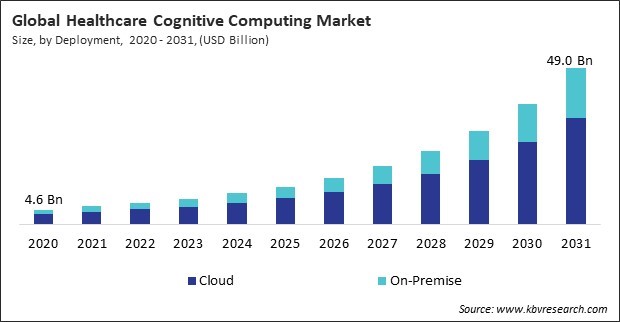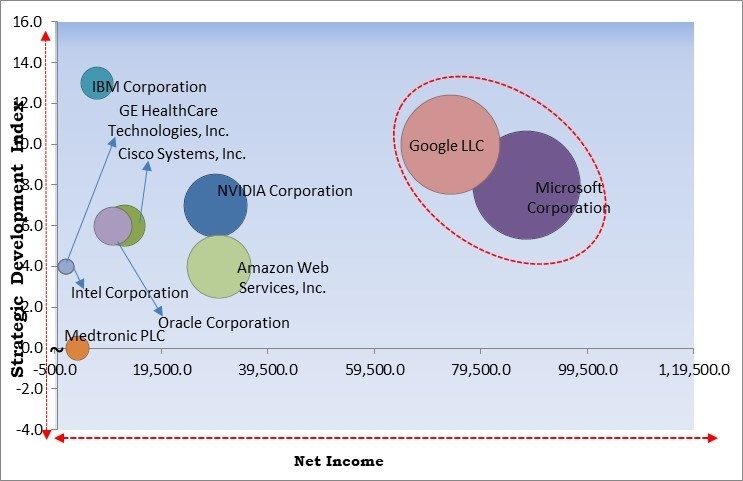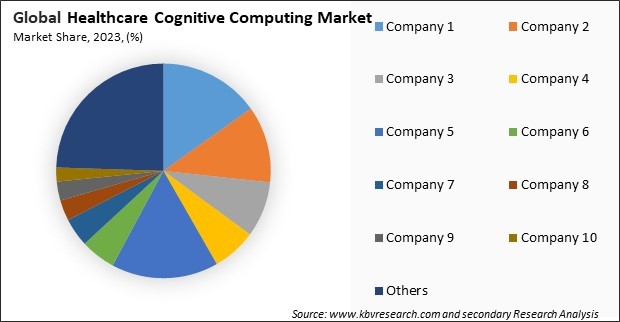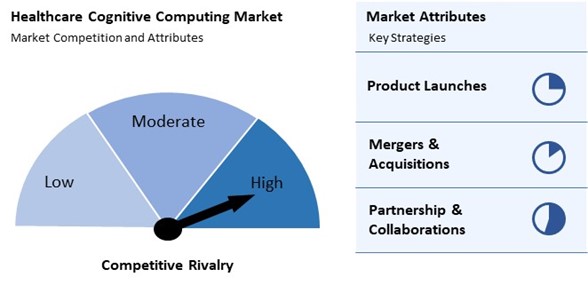“Global Healthcare Cognitive Computing Market to reach a market value of 49.0 Billion by 2031 growing at a CAGR of 26.1%”
The Global Healthcare Cognitive Computing Market size is expected to reach $49 billion by 2031, rising at a market growth of 26.1% CAGR during the forecast period.
The rising incidence of chronic diseases such as diabetes, cardiovascular diseases, and cancer in the Asia-Pacific region creates a growing need for advanced diagnostic and treatment tools. Cognitive computing can provide valuable insights for managing and treating these conditions effectively. Thus, the Asia Pacific region is expected to capture more than 1/4th revenue share in the market by the year 2031. Cognitive computing technologies enable predictive analytics that help in the early diagnosis and management of chronic diseases. This is crucial in the region, where managing the health of large populations with chronic conditions is a significant challenge.

The major strategies followed by the market participants are Partnerships as the key developmental strategy to keep pace with the changing demands of end users. For instance, In January, 2024, Amazon Web Services, Inc. partnered with Siemens, a global technology company, to integrate Bedrock with Siemens' Mendix low-code platform, enabling businesses to easily build generative AI applications. Additionally, In September, 2024, Oracle Corporation teamed up with AWS, a cloud computing company, to launch Oracle Database on AWS, enabling customers to access Oracle Autonomous Database and Exadata Database Service within AWS.
Based on the Analysis presented in the KBV Cardinal matrix; Google LLC and Microsoft Corporation are the forerunners in the Healthcare Cognitive Computing Market. In March, 2024, Microsoft Corporation partnered with NVIDIA, a semiconductor manufacturer, to bring generative AI, cloud, and accelerated computing to healthcare and life sciences. Companies such as Amazon Web Services, Inc., NVIDIA Corporation, Cisco Systems, Inc. are some of the key innovators in Healthcare Cognitive Computing Market.

The COVID-19 pandemic caused significant disruptions in healthcare operations, leading to delays in adopting and implementing cognitive computing technologies. Many healthcare organizations prioritized immediate pandemic response and patient care over investing in advanced technologies. Resources were diverted towards managing COVID-19 patients and dealing with the crisis, resulting in reduced focus and investment in cognitive computing projects. This shift affected the progress and deployment of cognitive computing solutions in healthcare settings. Managing and integrating this influx of data with existing systems proved challenging, affecting the effectiveness of cognitive computing applications. Thus, the COVID-19 pandemic had a negative impact on the market.
The widespread adoption of EHRs has led to a massive accumulation of patient data, including medical histories, test results, and treatment records. This rich data set provides a comprehensive view of patient health, which is essential for cognitive computing applications. The rise of wearable health devices and Internet of Things (IoT) technologies has introduced a continuous stream of health-related data. By analyzing genetic, clinical, and lifestyle data, healthcare providers can tailor treatments to individual patient needs, enhancing effectiveness. Hence, the exponential growth of healthcare data volume and big data analytics drives the market’s growth.
Personalized medicine relies heavily on genomic data to understand individual genetic profiles. Cognitive computing systems are essential for analyzing large volumes of genomic data to identify genetic markers, mutations, and correlations with diseases, enabling the development of personalized treatment plans. Personalized medicine integrates various types of omics data, including genomics, proteomics, and metabolomics. This optimization ensures that patients receive therapies that are most likely to be effective, minimizing trial-and-error approaches. Thus, the growing adoption and integration of personalized medicine initiatives drive the market’s growth.
Many healthcare institutions rely on legacy IT systems that may not be compatible with modern cognitive computing technologies. Integrating advanced cognitive systems with these outdated systems can be technically challenging and may require extensive modifications or upgrades, increasing the complexity and cost of implementation. Cognitive computing systems often require data in specific formats or standards. Existing IT infrastructure may use different data formats or standards, making ensuring seamless data exchange and integration difficult. This lack of standardization can lead to data inconsistencies and integration issues. Hence, the complexity of integrating cognitive systems with existing IT infrastructure is impeding the market’s growth.

The leading players in the market are competing with diverse innovative offerings to remain competitive in the market. The above illustration shows the percentage of revenue shared by some of the leading companies in the market. The leading players of the market are adopting various strategies in order to cater demand coming from the different industries. The key developmental strategies in the market are Partnerships & Collaborations.
Based on technology, the market is divided into natural language processing, machine learning, automated reasoning, and information retrieval. In 2023, the natural language processing segment garnered 40% revenue share in the market. The market growth is driven by the expanding use of Natural Language Processing (NLP), which enhances search functionality through natural language keywords in various scenarios and analyses.

On the basis of deployment, the market is segmented into cloud and on-premise. In 2023, the on-premise segment attained 30% revenue share in the market. On-premises solutions give healthcare organizations greater control over their data, which is crucial given the sensitive nature of patient information. Organizations can better safeguard against potential breaches and unauthorized access by keeping data within their own infrastructure.
Free Valuable Insights: Global Healthcare Cognitive Computing Market size to reach USD 49.0 Billion by 2031
Region-wise, the market is analyzed across North America, Europe, Asia Pacific, and LAMEA. The North America region witnessed 37% revenue share in the market in 2023. North America, particularly the United States and Canada, has a well-established and advanced healthcare infrastructure. This includes comprehensive electronic health records (EHR) systems, telemedicine platforms, and digital health initiatives, creating a strong foundation for integrating cognitive computing technologies. The region has high adoption rates of healthcare technologies, driven by a focus on improving patient care and operational efficiency.

The healthcare cognitive computing market is highly competitive, driven by the need for advanced AI and machine learning solutions to improve diagnostics, treatment planning, and patient care. Companies are focusing on developing platforms that analyze vast healthcare data, enhance decision-making, and streamline operations. The market is fueled by rising investments in AI-driven healthcare technologies, with competition intensifying as both tech giants and startups innovate in areas like medical imaging, personalized medicine, and predictive analytics.
| Report Attribute | Details |
|---|---|
| Market size value in 2023 | USD 8.0 Billion |
| Market size forecast in 2031 | USD 49.0 Billion |
| Base Year | 2023 |
| Historical Period | 2020 to 2022 |
| Forecast Period | 2024 to 2031 |
| Revenue Growth Rate | CAGR of 26.1% from 2024 to 2031 |
| Number of Pages | 207 |
| Tables | 263 |
| Report coverage | Market Trends, Revenue Estimation and Forecast, Segmentation Analysis, Regional and Country Breakdown, Competitive Landscape, Market Share Analysis, Porter’s 5 Forces Analysis, Company Profiling, Companies Strategic Developments, SWOT Analysis, Winning Imperatives |
| Segments covered | Deployment, Technology, Region |
| Country scope |
|
| Companies Included | Microsoft Corporation, IBM Corporation, NVIDIA Corporation, Intel Corporation, GE HealthCare Technologies, Inc., Medtronic PLC, Oracle Corporation, Google LLC, Cisco Systems, Inc., Amazon Web Services, Inc. |
By Deployment
By Technology
By Geography
This Market size is expected to reach $49 billion by 2031.
Exponential Growth of Healthcare Data Volume and Big Data Analytics are driving the Market in coming years, however, High Implementation Costs and Financial Barriers for Healthcare Institutions restraints the growth of the Market.
Microsoft Corporation, IBM Corporation, NVIDIA Corporation, Intel Corporation, GE HealthCare Technologies, Inc., Medtronic PLC, Oracle Corporation, Google LLC, Cisco Systems, Inc., Amazon Web Services, Inc.
The expected CAGR of this Market is 26.1% from 2024 to 2031.
The Cloud segment is leading the Market by Deployment in 2023; thereby, achieving a market value of $33.4 billion by 2031.
The North America region dominated the Market by Region in 2023; thereby, achieving a market value of $17.4 billion by 2031.
Our team of dedicated experts can provide you with attractive expansion opportunities for your business.

 Drivers
Drivers
 Restraints
Restraints
 Opportunities
Opportunities
 Challenges
Challenges
